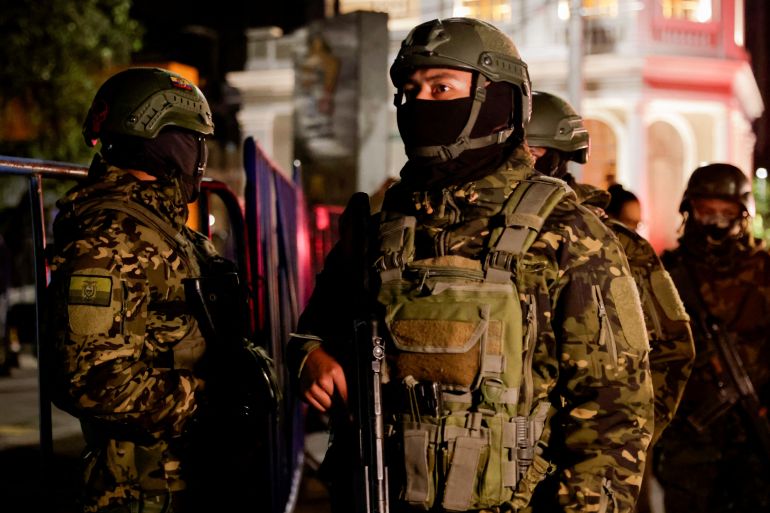Mexico suspends ties with Ecuador after police raid embassy
Ecuador police storm Mexico’s embassy in Quito to arrest former vice president Jorge Glas.

Mexico has suspended diplomatic relations with Ecuador after police forcibly broke into its embassy in Quito and arrested former Ecuadorian vice president Jorge Glas who had sought political asylum there.
Glas, who had been convicted twice of corruption, has been staying in the Mexican embassy since December, claiming he was being persecuted by Ecuadorian officials.
Mexico’s Ministry of Foreign Affairs said in a statement on Friday that it had offered political asylum to Glas, calling on Ecuador to grant him “safe passage” out of the country.
But Ecuadorian special forces, wearing tactical gear including bulletproof vests and helmets, forcefully entered the embassy on Friday night and arrested Glas.
“Ecuador is a sovereign nation and we are not going to allow any criminal to stay free,” Ecuador’s presidency wrote in a statement shortly before the raid.
Mexican President Andres Manuel Lopez Obrador wrote in a post on X that the storming of the embassy and arrest of Glas constitute an “authoritarian act” and “a flagrant violation of international law and sovereignty of Mexico”.
For many Ecuadorians it seemed like a “mockery of justice” that the convicted former vice president was being granted political asylum by Mexico, especially considering that he is an ally of the Mexican president, said lawyer and political commentator Adrian Perez Salazar.
“But the fact that there was this grievance does not – at least under international law – justify the forceful breach of an embassy,” Salazar told Al Jazeera from Guayaquil, Ecuador.
Mexico to take case to ICJ
Alicia Barcena, Mexico’s foreign minister, said on X that a number of diplomats suffered injuries during the incident – which she called a violation of the Vienna Convention on diplomatic relations.
Mexican diplomatic personnel will “immediately” leave Ecuador, Barcena said, adding that Mexico will appeal to the International Court of Justice (ICJ) to hold Ecuador accountable for violations of international law.
“International law is very clear that embassies are not to be touched, and regardless of whatever justifications the Ecuadorian government might have, it is a case where the end does not justify the means,” Salazar told Al Jazeera.
The situation had escalated a day earlier after the Mexican president made remarks about Ecuador’s elections which the South American country said it considered “very unfortunate”.
Lopez Obrador had commented on the assassination last year of Ecuadorian presidential candidate Fernando Villavicencio, comparing it with recent violence in the run-up to the current election cycle in Mexico, which had seen several local candidates shot.
He implied that frontrunner Luisa Gonzalez ultimately lost the election because of Villavicencio’s murder and the media speculation it produced.
Lopez Obrador also took aim at “owners of media outlets” and those that he deemed were responsible for an “atmosphere of violence” throughout election campaigns.
Ecuador’s government subsequently declared Mexican ambassador Raquel Serur Smeke as persona non grata and directed her to leave the country “soon”.
Ecuador has been dealing with a new wave of violence since earlier this year, when riots erupted in prisons across the country, criminal leaders escaped custody and masked gunmen stormed a live television broadcast and took hostages.
-al jazeera






